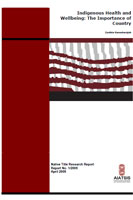Indigenous health and wellbeing: The importance of country
A key aspect to improving Indigenous wellbeing is exploring the relationship between land and wellbeing. Evidence exists that suggests there are positive physical health outcomes from living or working on country. However, it has also been argued that Indigenous health cannot improve whilst Indigenous peoples continue to live outside urban areas. These competing views will lead to the adoption of very different strategies for addressing Indigenous health issues. Therefore, it is critical to develop an understanding of the value of native title, the return of lands generally, or the capacity to live or work on country, to Indigenous peoples’ wellbeing.
The aim of this paper is to provide an overview of relevant material. The central argument is that Indigenous health strategies should take into consideration the importance of connection to country to maximise their effectiveness.
The paper begins with a discussion of the meaning of ‘wellbeing’. Section 3 presents research that investigates the impacts of country and connection to country on aspects of wellbeing. Section 4 contrasts two different explanations of why living or working on country has not improved Indigenous health thus far. Section 5 outlines current programs that provide opportunities for living or working on traditional lands or land generally. Section 6 draws together the information presented in the preceding sections.
